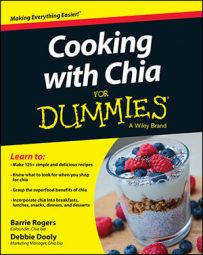Chia contains all four of the major nutrients needed for brain function. Eating plenty of chia can go a long way toward supporting the nutritional requirements of your brain in conjunction with a good balanced diet.
Eating well is just as important for your mental health as it is for your physical health. The brain needs nutrients to function just like the rest of your body does. If you eat the wrong foods, or too much food, you can gain weight and cause other health problems that you may be able to see physically, but a bad diet is detrimental to what goes on in the brain, too.
When you don’t feed your brain with the nutrients it needs, it can’t function well. The brain needs fat, protein, and carbohydrate to function properly, and it also needs antioxidants to defend itself from harm:
Fat: Two-thirds of the brain is made up of fat, and the brain needs healthy fatty acids to produce brain cells. These fatty acids form the membrane surrounding your brain cells — fuel passes in and waste passes out.
Omega-3 alpha-linolenic acid (ALA) and omega-6 fatty acids are essential fatty acids — you need to consume them because your body can’t make them. The body uses ALA and omega-6 fatty acids to make DHA fatty acids in the brain, and DHA is essential for the brain to function.
If you don’t consume essential fatty acids through food and/or supplements, you aren’t giving your brain the nutrients to produce what it needs. By consuming chia, you provide your brain with the all-important omega-3 ALA that it needs to function well.
Protein: When you consume protein, it’s broken down into its amino acids, which are then rebuilt into the different types of protein the brain needs to function. Chia is a complete protein — it has all nine essential amino acids that you need from your diet. These essential amino acids support the brain and can prevent decline in mood and cognitive performance.
Carbohydrates: Carbohydrates are important for fueling the brain. When your body digests carbohydrates, they’re mostly broken down into glucose, which is a simple form of sugar that provides energy. Glucose is the brain’s primary energy source, but the brain can’t store glucose, so it needs a steady supply of it through the bloodstream.
The carbohydrates found in chia seeds release their energy slowly, allowing the brain to get the energy it needs to function well.
Antioxidants: The brain relies on antioxidants to protect it from damage and impaired function. Oxygen balance is vital to brain health. But certain forms of oxygen, called free radicals, can damage brain cells through a process known as oxidation. Antioxidants neutralize these free radicals before they can cause any damage.
Chia is high in natural antioxidants that help protect against free radicals. Vitamins, as well as the minerals iron, copper, magnesium, manganese, and zinc, are all necessary for different brain functions and are all contained in chia seeds.

